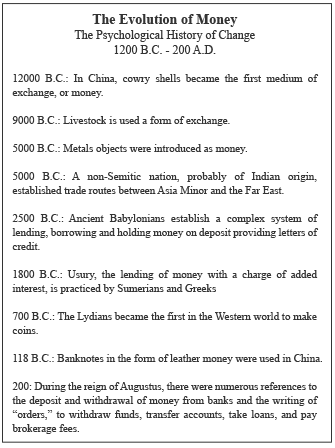 Consider the following statement:
Consider the following statement:
“The national budget must be balanced. The public debt must be reduced; the arrogance of the authorities must be moderated and controlled. Payments to foreign governments must be reduced, if the nation doesn’t want to go bankrupt. People must again learn to work, instead of living on public assistance.”
Can you hazard a guess on when this warning was uttered and who made these dire predictions?
These statements were actually made more than 2,000 years ago by Roman author, orator, and politician Cicero in 55 BC. Economic history has a habit of repeating itself, because money (or at least the concept of the necessity for some tangible system of exchange to gauge value) is embedded in our DNA.
Was Cicero’s assessment accurate? Such statements could easily be attributed to any number of politicians and pundits today (most likely from the Grand Old Party). However, we know there are certainly opposing viewpoints.
 Whether it is Cicero or Fox News, regardless when such statements are made, they reflect that there is a distinct psychological component to our perception of our collective economic state. Here, Cicero offers an alarmist’s view that plays upon the insecurities of the populace. One wonders if there was an ancient liberal-leaning opponent that countered Cicero, yet is lost to time.
Whether it is Cicero or Fox News, regardless when such statements are made, they reflect that there is a distinct psychological component to our perception of our collective economic state. Here, Cicero offers an alarmist’s view that plays upon the insecurities of the populace. One wonders if there was an ancient liberal-leaning opponent that countered Cicero, yet is lost to time.
Power, control, survival, conquest, subservience, corruption—these are just some of the elements that have defined the human experience since our beginning. And, the psychology of the money and the mind has always been at the nexus of the development of finance, economics, and commerce.
Looking at the history of finance through a psychological lens can provide the financial professional with a better understanding of why markets behave the way they do.
Read Part Two of this 7 part series next week.
To contact Christopher Bayer directly, please email Christopher.Bayer@TheShareholderActivist.com.








